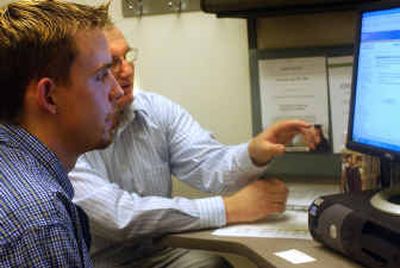Phoenix comes to Spokane

Jennipher Fay wants to finish her bachelor’s degree, but has to sandwich coursework between full-time work and parenting 1-year-old twins.
Fay found a user-friendly business management program at University of Phoenix, a for-profit university that has 160 schools that serve 260,000 students.
The school, which tailors programs to working adults, recently opened a new campus on Mission Avenue, off Argonne Road.
While the online university offers a range of degrees, the new Spokane Valley campus offers several targeted degrees that blend online and on-site coursework.
“It allows me to attend class when it meets my schedule,” Fay said. “I can hurry up and get things done because I have so many other things on my plate.”
The campus has a computer lab and seven large classrooms wired with high speed Internet. Smaller classrooms and meeting spaces are available, and the entire building boasts wireless Internet access.
The branch offers bachelor of science degrees in management or information systems and a master’s degree in business administration.
Paul Green, campus director, said this fall the campus will add a health-care management degree and, in the future, a criminal justice degree. He hopes to add an education degree, pending approval of Washington State Higher Education Coordination Board.
Students averaging 34 years of age pay $350 to $375 a credit for classes that earn three credits each. More than 200 people are currently enrolled in local classes.
“Our students come from every walk of life. They’re working moms who want to get ahead and they’re working adults who want to get the next pay raise,” Green said.
Online, students can access databases with 750 full textbooks and 20 million articles. Online classrooms facilitate discussions among students. Teachers monitor the class’s progress to ensure it’s moving in the right direction, and are available to answer questions by phone.
Like its students, university instructors actively work in outside professions. To be hired, instructors must have at least a master’s degree and more than two years’ experience working in the field they teach.
“Our faculty is doing what they’re teaching on a day-in, day-out basis,” Green explained.
Programs are based in part on research with national and local employers. They focus on skills that 330 employers in America’s fastest growing companies said were crucial for obtaining jobs and advancing professionally.
Green said some 40 to 50 percent of students receive some level of tuition assistance from their employers.
Virtual classrooms give students “real-life” scenarios, including business and ethical challenges.
Fay initially worried about accessing information online, but said she received teacher support to get her comfortable with the programs.
“My biggest thing is the fact that they have a lot of backup. If I don’t know what I’m doing, (help) is just a phone call away.”